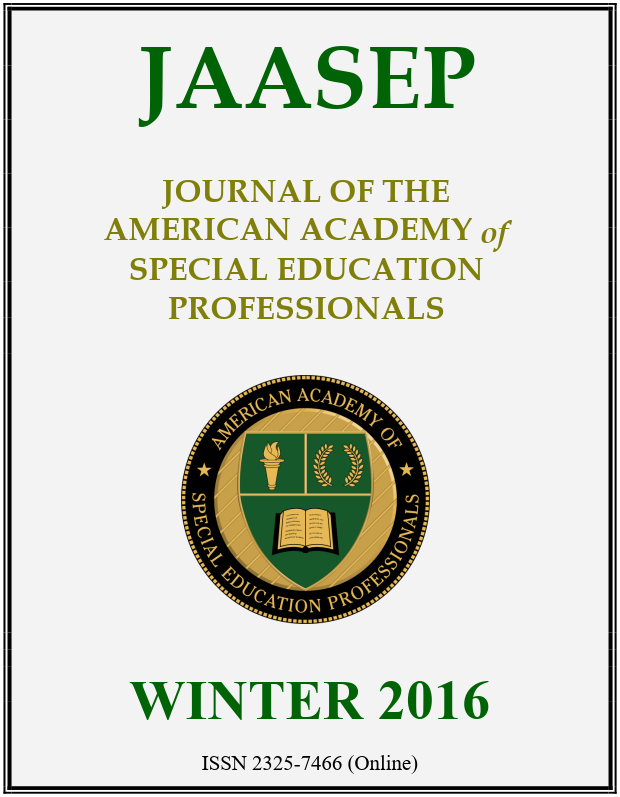High Stakes Testing in the 21st Century: Implications for Students in Special Education
Allensworth, E. (2005). Dropout rates after high-stakes testing in elementary school: A study of the contradictory efforts of Chicago’s efforts to end social promotion. Educational Evaluation and Policy Analysis, 27(4), 341-364. DOI: https://doi.org/10.3102/01623737027004341
Common Core State Standards Initiative. Retrieved from http://corestandards.org.
Fuchs, L., Fuchs, D., & Cappizzi, A. (2005). Identifying appropriate test accommodations for students with learning disabilities. Focus on Exceptional Children, 37(6). DOI: https://doi.org/10.17161/fec.v37i6.6812
Geller, L. Alonzo, J., Monegan, J., & Tindal, G. (2007). Recommendations for accommodations: Implications of (in)consistency. Remedial and Special Education, 28(4), 194-206. DOI: https://doi.org/10.1177/07419325070280040101
Hager, K. & Slocum, T. (2005). Using alternate assessment to improve educational outcomes. Rural Special Education Quarterly, 24(1), 24-29. DOI: https://doi.org/10.1177/875687050502400110
Jones, A. & King, J. (2012). The common core state standards: A vital tool for higher education. Change. Retrieved from http://www.changemag.org. DOI: https://doi.org/10.1080/00091383.2012.706529
Kaestle, C. (2013). Testing policy in the United States: A historical perspective (The Gordon Commission on the Future of Assessment in Education). Retrieved from http://www.gordoncommission.org.
Katsyiannis, A., Zhang, D., Joseph, R., & Jones, J. (2007). High-stakes testing and students with disabilities. Journal of Disability Policy Studies, 18(3), 160-167. DOI: https://doi.org/10.1177/10442073070180030401
Lane, S. (2013). The need for a principled approach for examining indirect effects of test use. Measurement, 11, 44-46. DOI: https://doi.org/10.1080/15366367.2013.784162
Linn, R. (2013). Test-based accountability (The Gordon Commission on the Future of Assessment in Education). Retrieved from http://www.gordoncommission.org.
McLaughlin, M., & Thurlow, M. (2010). Educational accountability and students with disabilities: Issues and challenges. Educational Policy, 17(4), 431-451. DOI: https://doi.org/10.1177/0895904803254962
McNeil, L., Coppola, E., Radigan, J., & Helig, J. (2008). Avoidable losses: High-stakes accountability and the dropout crisis. Education Policy Analysis Archives, 16(3). DOI: https://doi.org/10.14507/epaa.v16n3.2008
National Academy of Education (2009). Standards, assessment, and accountability (Education Policy White Paper). Washington, DC: Author.
National Center on Universal Design (2014). Retrieved from http://www.udlcenter.org.
Nirvi, S. (2012). Challenges seen in testing special ed. Pupils on common core. Education Week, 31(33).
Salend, S. (2008). Determining appropriate testing accommodations: Complying with NCLB and IDEA. Teaching Exceptional Children, 40(4), 14-22. DOI: https://doi.org/10.1177/004005990804000402
Salvia, J., Ysseldyke, J., & Bolt, S. (2010). Assessment: In special and inclusive education.
Wadsworth: California Samuels, C. (2014). Graduation disparities loom large for students with special needs. Education Week, 33(19).
Smarter Balanced Assessment Consortium (2014). Retrieved from http://smarterbalanced.org.
Stephens, W. (2014). Testing under the microscope: How aligned assessments place demands on time, technology & connectivity. Knowledge Quest, 43(1), 31-35.
Thurlow, M., Sinclair, M., & Johnson, D. (2002). Students with disabilities who drop out of school: Current challenges in secondary education and transition. National Center on Secondary Education and Transition Issue Brief, 1(2). U.S. Department of Education, National Center for Education Evaluation and Regional Assistance (2012). Inclusion of students with disabilities in school accountability systems (NCEE Publication No. 2012-4056). Retrieved from http://www.ed.gov/ies.ed.gov.
U.S. Department of Education, Office of Special Education and Rehabilitation Services, Office of Special Education Programs (2006, April). 26th Annual (2004) Report to Congress on the Implementation of the Individuals with Disabilities Education Act, Vol. 1. Washington, DC: Author.
U.S. Department of Education (2012). Race to the Top Initiative. Retrieved from http://www2.ed.gov/racetothetop.
Yell, M., Katsiyannis, A., Collins, J., & Losinski, M. (2012). Exit exams, high-stakes testing, and students with disabilities: A persistent challenge. Intervention in School and Clinic, 48(1), 60-64. DOI: https://doi.org/10.1177/1053451212449740
Downloads
Article Information
- Article Type Articles
- Submitted January 19, 2016
- Published February 15, 2016
- Issue Winter 2016
- Section Articles
